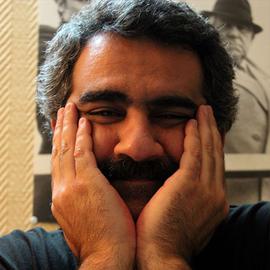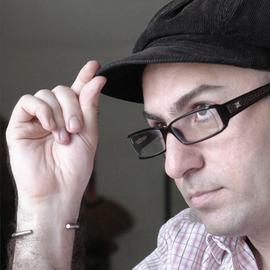The terrorist attack on French satirical magazine Charlie Hebdo on January 7 has spurred debates the world over on there should be limits to freedom of expression with regard to sensitive subjects like religion and offence. As a response to these discussions, IranWire asked six Iranian satirists three questions:
Are there lines a satirist should not cross?
Is there a clear distinction between ridicule and satire? Can something be satirical and mocking at the same time ?
As a means of changing culture and a society’s mindset, can ridicule be used to destroy certain elements and humor to build new ones?
Hadi Khorsandi, poet and satirist, London

Humor has no red lines. A satirist, whether a writer or a cartoonist, has no army or weapons, so he can’t coerce people. There’s no need to limit his powers. He could draw me in the shape of a donkey and that would be his own business but if he accuses me of something, he needs to be held accountable by the law like any other citizen.
However, when expressing his opinions he should be free, like any other citizen. If we start drawing lines for freedom of expression, we come to the kind of freedom granted under dictatorships.
The law is a satirist’s only red line. A satirist can’t issue religious edicts or decrees. It’s remarkable that governments don’t have red lines and politicians have no moral duties, but that cartoonists and satirists do. According to the late Iranian satirist Manouchehr Ehterami, “one should know how to sit on a red line without getting stained.”
There’s no big difference between satire and ridicule but within different frameworks of culture, time, place and language, a distinction does show itself. Ridicule is about the individual and humor is about what the individual has done.
It depends on the skills of the satirist and on what he’s constructing. It depends on how much the viewer or reader appreciates the humor being used.
Tooka Neyestani, cartoonist and satirist, Toronto

I believe a satirist can and must work on any subject he or she wants. This is their undeniable right to freedom of expression. There are no clear red lines for a writer or humorist but every satirist believes in principles that act as their own personal moral red lines.
Humorists want to do more than ridicule and humiliate others and believe that society can benefit from their work. Wisdom and intelligence are necessary to distinguish humor from ridicule.
Using ridicule to tear down cultural beliefs in a society is an idea that needs to be approached with caution. The problem with ridicule is that it makes a victim of a subject. And people usually sympathize with a victim, especially when they feel that personal animosity is involved.
It becomes more difficult when the dominant culture in society is ridiculed because people naturally resist change to their customs. This resistance is intensified when they think their beliefs have been targeted unjustly. Tearing down and reconstructing a culture needs a large amount of patience and intelligence that ridicule lacks. It depends on who is using the weapon of ridicule and how.
Alireza Rezaee, satirist and writer, Paris

Morality changes depending on things like time and society, but there are moral values that remain constant. Things I satirize vary from one day to the next but enforcing “red lines” for humor is a joke.
What a reader considers humor and ridicule are directly dependent on how much they’ve enjoyed the work.
It’s been proven to me that you can build and you can destroy, but that most importantly, you destroy in a manner that doesn’t make building impossible. In my profession, if I destroy something in a way that means it can’t be rebuilt, then I’ve destroyed myself before destroying the structure.
Maziar Jobrani, screen actor and stand-up comedian, Los Angeles

I think a satirist should be able to say whatever he wants. I’m a staunch supporter of freedom of expression but satirists must be funny before all else. I know comedians want to shock their audience but to succeed they need to be funny. I only joke about people in positions of power. I would never make jokes about other “weak” people, for example the disabled.
Humor and ridicule can’t be separated easily. A lot of comedians use ridicule but this is often lost on people. I’ve annoyed some of my US audiences before because of what I’ve joked about.
All types of comedy push society forward. Societies need to make themselves immune to humor and jokes so that they can tolerate them.
Bozorgmehr Hassanpour, satirist, cartoonist and writer, Tehran

There is no clear-cut definition of morality. Depending on the location and spirit of the place, it adopts a different meaning. As a cartoonist I need to adapt to the conditions of my environment.
Humor and ridicule are different. Ridicule mocks, jeers and sometimes swears and curses and its main goal is to destroy, while humor serves to build. In ridicule, humiliation is one of its main tools but humiliation is absent in humor.
I’m still struggling with the meaning of my profession. I can only say that I work by a set of rules.
My pen does not serve to tear down walls or act as a “tool of destruction.” Also, I don’t feel I have a mission to enlighten my audience because I don’t feel I’m enlightened enough myself to enlighten others. I don’t like drawing cartoons of people whom I like very much — this is why I’ve never drawn my wife. My heart makes the rules for my pen. I have the highest regard for spirituality and therefore I don’t use my pen to criticize or caricature.
Shahram Shahidi, poet and satirist, Tehran

My red lines include defending and telling the truth and trying to improve society. I try to pinpoint what’s wrong. I also don’t satirize the unquestionable rights of people, including their freedom of expression, articles under the Universal Declaration of Human Rights, the right to choose a religion, speak your native language, or the rights of women, children and animals. I don’t joke about things that need support.
The definitions of humor and ridicule have always varied for different people; you can’t pigeonhole them. Something I deem to be humor might be ridicule to someone else. For example, I might satirize the way people belonging to a social category dress but somebody else might find the topic sacred.
In my opinion the only rule to avoid is causing insult. I believe you can satirize everything and anything provided that you don’t do that. For instance, you can criticize the way a president dresses but you can’t joke about his height or looks because they’re not his choice and therefore it’s insulting.
I agree to some extent that ridicule is a necessary tool to tear down when we want to rebuild. Maybe both are necessary but right now we can’t use both because we don’t have the right cultural foundations for it. Culture doesn’t want to hear it and the law doesn’t support it. At this point ridicule is only used for revenge and destroying reputations in Iran.
visit the accountability section
In this section of Iran Wire, you can contact the officials and launch your campaign for various problems























comments